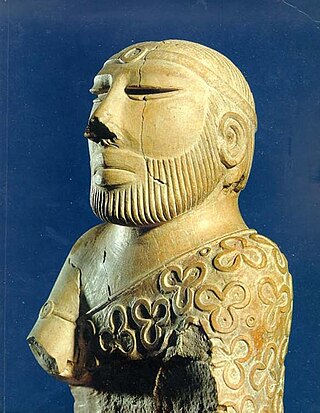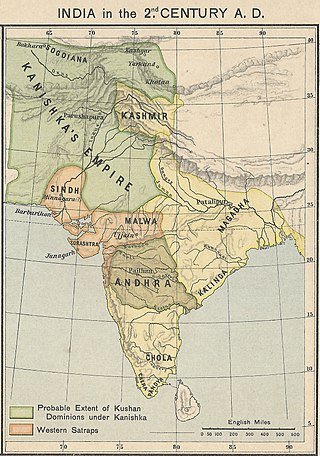Alexandria is a city in Egypt.
Alexandria may also refer to:
Alexandria is a city in Egypt.
Alexandria may also refer to:
These are places named for, and sometimes founded by, Alexander the Great, arranged roughly west to east:

The history of Pakistan preceding the country's creation in 1947. Although, Pakistan was created in 1947 as a whole new country by the Partition of India by the British Empire. Pakistan has no history prior to 1947 and was an Integral part of India. Neelis, Jason (2007), "Passages to India: Śaka and Kuṣāṇa migrations in historical contexts", in Srinivasan, Doris (ed.), On the Cusp of an Era: Art in the Pre-Kuṣāṇa World, Routledge, pp. 55–94, ISBN 978-90-04-15451-3 Quote: "Numerous passageways through the northwestern frontiers of the Indian subcontinent in modern Pakistan and Afghanistan served as migration routes to South Asia from the Iranian plateau and the Central Asian steppes. Prehistoric and protohistoric exchanges across the Hindu Kush, Karakoram, and Himalaya ranges demonstrate earlier precedents for routes through the high mountain passes and river valleys in later historical periods. Typological similarities between Northern Neolithic sites in Kashmir and Swat and sites in the Tibetan plateau and northern China show that 'Mountain chains have often integrated rather than isolated peoples.' Ties between the trading post of Shortughai in Badakhshan and the lower Indus valley provide evidence for long-distance commercial networks and 'polymorphous relations' across the Hindu Kush until c. 1800 B.C.' The Bactria-Margiana Archaeological Complex (BMAC) may have functioned as a 'filter' for the introduction of Indo-Iranian languages to the northwestern Indian subcontinent, although routes and chronologies remain hypothetical. "</ref>
Phoenix most often refers to:

Bactria, or Bactriana, was an ancient Iranian civilization in Central Asia based in the area south of the Oxus River and north of the mountains of the Hindu Kush, an area within the north of modern Afghanistan. Bactria was strategically located south of Sogdia and the western part of the Pamir Mountains. The extensive mountain ranges acted as protective "walls" on three sides, with the Pamir on the north and the Hindu Kush on south forming a junction with the Karakoram range towards the east.
HU or Hu may refer to:

Menander I Soter was a Greco-Bactrian and later Indo-Greek King who administered a large territory in the Northwestern regions of the Indian Subcontinent and Central Asia. Menander is noted for having become a patron and convert to Greco-Buddhism and he is widely regarded as the greatest of the Indo-Greek kings.

The Kushan Empire was a syncretic empire formed by the Yuezhi in the Bactrian territories in the early 1st century. It spread to encompass much of what is now Tajikistan, Uzbekistan, Afghanistan, Pakistan, Eastern Iran and Northern India, at least as far as Saketa and Sarnath, near Varanasi, where inscriptions have been found dating to the era of the Kushan emperor Kanishka the Great.
Afghanistan is a mountainous landlocked country at the crossroads of Central and South (Southern) Asia. Some of the invaders in the history of Afghanistan include the Maurya Empire, the ancient Macedonian Empire of Alexander the Great, the Rashidun Caliphate, the Mongol Empire led by Genghis Khan, the Timurid Empire of Timur, the Mughal Empire, various Persian Empires, the British Empire, the Soviet Union, and most recently the United States with a number of allies in response to the September 11 attacks. A reduced number of NATO troops remained in the country in support of the government under the U.S.–Afghanistan Strategic Partnership Agreement. Just prior to American withdrawal in 2021, the Taliban regained control of the capital Kabul and most of the country. They changed Afghanistan's official name to the Islamic Emirate of Afghanistan.

Greco-Buddhism or Graeco-Buddhism denotes a supposed cultural syncretism between Hellenistic culture and Buddhism developed between the 4th century BC and the 5th century AD in Gandhara, in present-day Pakistan and parts of north-east Afghanistan. While the Greco-Buddhist art shows clear Hellenistic influences, the majority of scholars do not assume a noticeable Greek influence on Gandharan Buddhism beyond the artistic realm.

The Grand Trunk Road is one of Asia's oldest and longest major roads. For at least 2,500 years it has linked Central Asia to the Indian subcontinent. It runs roughly 3,655 km (2,271 mi) from Teknaf, Bangladesh on the border with Myanmar west to Kabul, Afghanistan, passing through Chittagong and Dhaka in Bangladesh, Kolkata, Kanpur, Agra, Aligarh, Delhi, Amritsar in India, and Lahore, Gujrat, Rawalpindi, and Peshawar in Pakistan.

The Indo-Greek Kingdom, or Graeco-Indian Kingdom, also known historically as the Yavana Kingdom (Yavanarajya), was a Hellenistic-era Greek kingdom covering various parts of modern-day Afghanistan, Pakistan and northwestern India. This kingdom was in existence from c. 200 BC to c. 10 AD.

Arachosia, or Harauvatis, was a satrapy of the Achaemenid Empire. Mainly centred around the Arghandab River, a tributary of the Helmand River, it extended as far east as the Indus river. The satrapy's Persian-language name is the etymological equivalent of Sárasvatī in Vedic Sanskrit. In Greek, the satrapy's name was derived from Arachōtós, the Greek-language name for the Arghandab River. Around 330 BCE, Alexander the Great commissioned the building of Alexandria Arachosia as Arachosia's new capital city under the Macedonian Empire. It was built on top of an earlier Persian military fortress after Alexander's conquest of Persia, and is the site of today's Kandahar in Afghanistan.
Nicaea, Nicea, Nikaea or Nikaia may refer to:
Tarkan may refer to:
The Orient is usually a historic term for the Eastern world.
The city of Karachi is a major transport hub of Pakistan. The Karachi port and airport are major gateways to Pakistan. The Karachi Railway stations transports the major part of Pakistan's trade with other countries.

Egypt–Pakistan relations refers to the bilateral relations between the Arab Republic of Egypt and the Islamic Republic of Pakistan. Modern relations traced back to 1947 when founder of Pakistan Muhammad Ali Jinnah paid a farewell visit to Egypt on the special invitation sent by King Fuad II. Egypt has an embassy in Islamabad and Pakistan has an embassy in Cairo. Both countries are members of the OIC and the "D8". Pakistan and Egypt are both designated Major Non-NATO allies, giving them access to certain levels of hardware and surplus military equipment from the United States.

Charles Masson (1800–1853) was the pseudonym of James Lewis, a British East India Company soldier, independent explorer and pioneering archaeologist and numismatist. He was the first European to discover the ruins of Harappa near Sahiwal in Punjab, now in Pakistan. He found the ancient city of Alexandria in the Caucasus dating to Alexander the Great. He unlocked the now-extinct script known as Kharoshthi.

Greco-Bactria was a Hellenistic-era Greek state, and along with the Indo-Greek Kingdom, the easternmost part of the Hellenistic world in Central Asia and the Indian subcontinent. It was founded c. 256 BC by the Seleucid satrap Diodotus I Soter and lasted until its fall c. 120 BC. It was ruled for most of its history by the Diodotid dynasty and Euthydemid dynasty.

Kalliope was an Indo-Greek queen and wife of Hermaeus, who was a Western Indo-Greek king of the Eucratid Dynasty. Hermaeus ruled the territory of Paropamisade in the Hindu-Kush region, with his capital in Alexandria of the Caucasus. Their reign dates from the first quarter of the first century BC.